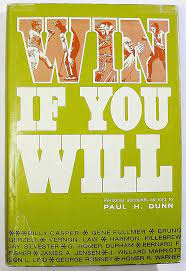Articles/Essays – Volume 07, No. 2
Lives to Inspire | Hartman and Connie Rector, No More Strangers, and Paul H. Dunn, Win If You Will
Both of these books are composed of a number of short autobiographical accounts of L.D.S. Church members who have achieved success in important personal quests. Win If You Will, like a series of good Priest’s Quorum Meetings, presents outstanding athletes, scientists, businessmen and others who describe the self-discipline, persistence and allegiance to Gospel principles that led them to secular success. No More Strangers is like a Fast and Testimony Meeting in which a number of converts describe their spiritual path to the Kingdom.
In both works, the autobiographies included are of persons who fit the objectives of the book and who have a special appeal to Church members. The two books make a solid contribution towards overcoming the rather narrow focus on the Church elite that has characterized the writing of most L.D.S. authors. While none of the autobiographers included are common men or women, as demonstrated by the depth of talent and motivation they have manifested, neither are most of them General Authorities, descendents of Hyrum Smith, or even descendants of the Pioneer Band of 1847. Furthermore, these individuals with few exceptions emerge as believable people who have dealt successfully with disbelief, failure and even acclaim.
Another common strength is the autobiographical format of the two books. Such an approach risks degenerating into apology, giving too little credit to other persons, or omitting important detail. The two books were not entirely free from these and similar problems, but most of the respondents were markedly successful in presenting cogent, well written narratives that packed a great deal of detail into a short space.
Quite successful in achieving their general objectives, both books have weaknesses. Win If You Will, though slightly the stronger in regards to overall quality, has the more noticeable deficiencies. In presenting heroes for young people to use as examples, Elder Dunn selects six athletes, three scientists, two businessmen, one military hero and a token educator. The emphasis upon athletes perpetuates a type that has been overworked already. Furthermore, since the book is dedicated to the youth of the Church in general, it should have been possible to find at least a token female worthy of adulation. The message of the title Win If You Will is somewhat misleading also. Despite the modest assurances of thirteen gifted persons that anyone can succeed since they did, there is a strong likelihood that most children born with cerebral palsy will never become football quarterbacks, and tone deaf students will rarely become virtuoso musicians. Besides, if everyone were committed to denying every other facet of their lives in order to be able to throw a discus 198’8″, or design lunar landing components or medical computers, this world would soon lose the variety that makes it enjoyable. On the other hand, there is little danger that most of us are going to over-exert ourselves, and this book’s pulsing message of dedication, self-denial and discipline is timely for a per missive generation.
No More Strangers has better balance in the selection of respondents and succeeds well in conveying its message. However, there is something almost pathetic in the compulsion felt by a number of these converts to convince the reader of their conversion experience, as if this were seventeenth-century New England, and each of these a Michael Wigglesworth being given a hearing by the Puritan fathers to determine worthiness for admission as a full Church member. This need to feel that they are in fact “no more strangers” is probably better understood by the convert than by those comfortable Saints who trace all of their ancestors back to Nauvoo.
A noticeable defect in the style of No More Strangers is the tendency for the editor’s introduction to each autobiography to give too much of the respondent’s story. This book (and for that matter, Win If You Will also) would have been strengthened by having an introduction at the beginning that briefly discussed each informant, followed by the autobiographies presented without editorial comment as separate chapters.
In dwelling on the slight defects of these two works, which are bound to be more noticeable to the hyper-critical reviewer than to the gentle reader, there is the danger of downplaying their quality. Both have a worthwhile message and convey it in a highly interesting manner. Both are sufficiently successful in presenting the experiences of modern day builders of the Kingdom that they will be well received by Church members.
No More Strangers. By Hartman and Connie Rector. Salt Lake City: Bookcraft, Inc., 1971. 168 pp. $3.50.
Win If You Will. By Paul H. Dunn. Salt Lake City: Bookcraft, Inc., 1972. 257 pp. $4.50.


 Back to full Issue
Back to full Issue

